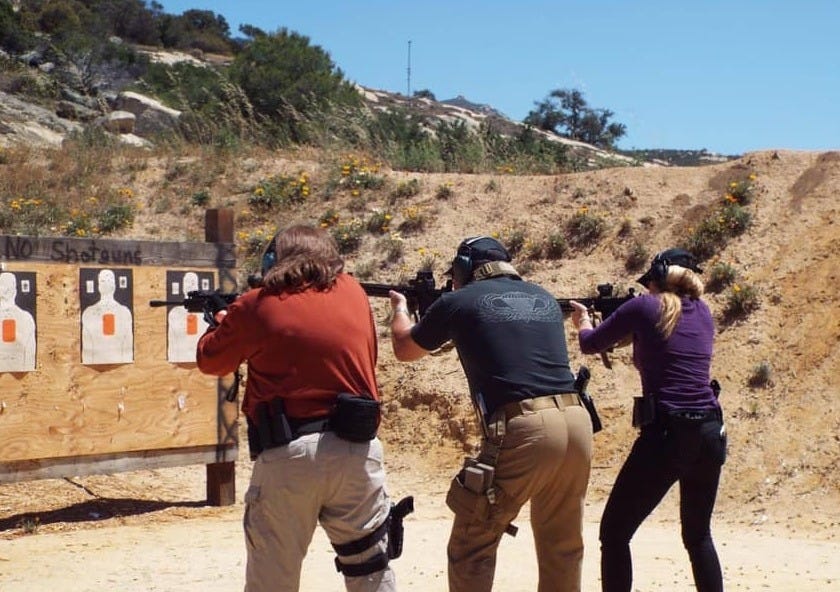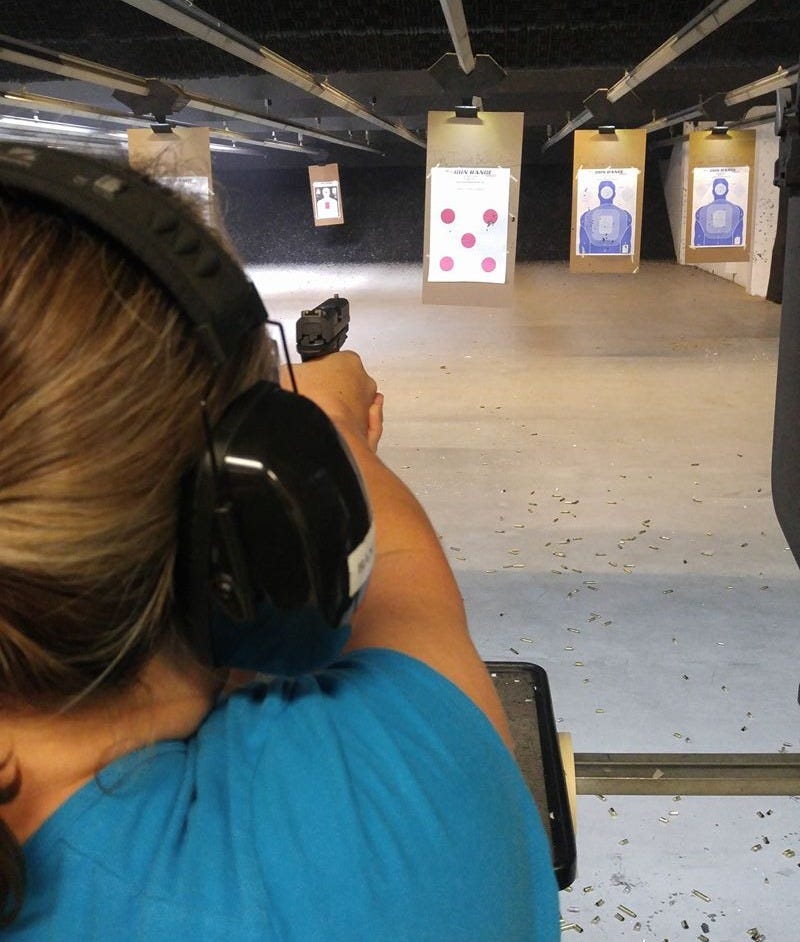More Transgender Americans Are Arming Themselves Under Trump
Since the November election, the Pink Pistols—an international LGBTQ gun rights organization—says that over 20 local chapters have been created or reactivated.
Since Donald Trump won the election on Nov. 5, Aeryn has been quietly stockpiling hormone replacement therapy and ammunition, things she sees as essential for living as a transgender woman under the current administration.
She has filled her garage with “20 to 30,000 rounds of ammunition” and up to a year’s worth of estrogen—reaching the outer boundary of the drug’s one- to two-year shelf life.
“Starting with the election, I became very concerned,” she told Uncloseted Media.
Animosity toward trans people in the U.S. is at an all-time high. President Trump has signed a laundry list of executive orders rolling back transgender rights, including one that says—in the eyes of the federal government—trans people don’t exist. Trump has vilified trans people with rhetoric that casts them as a threat to women and children, and during the campaign he made it a promise to get rid of so-called “transgender insanity.”
Anti-trans sentiment has seeped into left-wing circles, too. Some Democrats blamed Kamala Harris’ loss on the party’s stance on trans rights.
All of this has created a perfect storm where nearly three-quarters of trans people in the U.S. now fear physical violence. That’s why many trans people are taking measures to defend themselves by enrolling in training programs, buying guns and learning self-defense.
Fears of violence against queer people are warranted. In 2023, LGBTQ people were five times more likely than non-LGBTQ people to be victims of violent crimes, according to a new study from the Williams Institute. And an FBI report found that there were 547 recorded incidents targeting a victim’s gender identity in 2023, up from 469 the year prior.
Trans women are in an especially dangerous position today, facing the bulk of anti-trans rhetoric and legislation. From bathroom bans to restrictions from sports participation, much of the right-wing focus on trans issues is aimed at trans women. The disproportionate attention on the demographic not only fuels hostility but encourages violence. According to Heidi Beirich, the co-founder of the Global Project Against Hate and Extremism, sustained bigotry can translate to violence.
“There is a link between online hate and real-world violence in terms of hate crimes," Beirich told Uncloseted Media. “When you demonize communities, it does link to violence.”
For Aeryn, the escalation of anti-trans rhetoric and Trump’s actions have motivated her to prepare for violence.
“It leaves our community to fend for itself and at least be prepared for armed aggression,” she says.
Aeryn, 52, who didn’t feel safe revealing her last name or location, feels lucky to have never experienced any violence personally. But she worries it’s only a matter of time until something happens.
“I think it’s quite likely the administration will at least try to say being transgender is a mental health condition,” she says. Her biggest fear is that the Trump administration will place transgender people under government-sanctioned control, something akin to WWII-era internment camps.
As a safety precaution, she is moving from a red to a blue state—an action nearly half of transgender Americans have considered, according to a 2022 study.
Aeryn, a lifelong gun owner, entered the Marine Corps at 19 and learned to shoot long before she transitioned. There have been other instances where she has stockpiled ammunition, like during the pandemic, but she’s never feared for her safety as a trans woman more than right now.
“I’m worried not in societal breakdown … but a targeted, direct attack on the LGBTQ community and trans people specifically.”
Aeryn is just one of many trans Americans who feel the need to protect themselves under Trump 2.0. Pink Pistols—an international LGBTQ gun rights organization—says that over 20 local chapters have been created or reactivated since the November election.
“There’s definitely been a lot of interest and a lot of concern over what’s going on in the government,” says Erin Palette, the Pink Pistols national coordinator and the founder of Operation Blazing Sword, a firearm education organization that works in tandem with the Pistols.
Operation Blazing Sword instructors teach queer people the basics of firearm safety, including how to safely load and unload, aim and shoot with precision. They also teach the importance of proper maintenance and care, including how to clean and store firearms.
Palette says the 2016 Pulse nightclub mass shooting, which left 49 people dead and was deemed a terrorist attack by the FBI, was a key reason she started the group. She refers to it as the “queer 9/11” and believes it unearthed an underlying threat against LGBTQ people that lay dormant in America long before the massacre.
“A lot of queer people went, ‘Wow, it really doesn't matter what I do or say. There are still people who want me dead, and they are going to take action to make that happen,’” Palette told Uncloseted Media. “And so they realized the danger they had already been in. It just became personal.”
Beirich says the reaction to Pulse and the current self-defense measures trans people are taking under Trump 2.0 are similar to the actions taken by other minorities in the country following acts of domestic terrorism.
“After the attack at the Pittsburgh synagogue, many Jewish communities across the country invested in cameras, hardening up Jewish areas,” Beirich says, referring to the 2018 Tree of Life synagogue shooting, where a right-wing extremist killed 11 congregants.
Beirich says direct violence, like the Pulse shooting, and structural violence, such as anti-trans laws at the state and federal levels, have given queer people reason to arm themselves. "This is the kind of situation when you're in it that makes you want to arm up because you feel like the state can't protect you,” she says. “It's made all the worse when the federal government actually buys into the same anti-LGBTQ ideas that the Pulse shooter exhibited."
As Palette began training queer people to use firearms after Pulse, some others moved away from gun ownership. Carly, a trans woman and longtime gun store manager, says her relationship with firearms soured after Pulse. She sold her stake in the gun store and disarmed for several years, concerned she was contributing to the problem.
“I [couldn’t] guarantee that the guns that I [was] selling [wouldn’t] ever be pointed at me,” Carly, who also didn’t feel safe providing her last name, told Uncloseted Media.
But that changed once she first heard about Project 2025, the 920-page document that outlined a plan to consolidate power in the executive branch and enforce far-right policies that included an anti-trans framework.
“I saw the writing on the wall,” she says.
While there have been false narratives on social media about how trans folks disproportionately commit acts of domestic terrorism, Palette makes clear that the purpose of Pink Pistols is to teach self-defense.
“I carry a firearm. It doesn't mean that I'm a police officer,” she says. “It's just a tool that I have to address the immediate situation while I wait for the professionals to arrive.”
Marc Stein, a professor of queer history at San Francisco State University, says the LGBTQ community has a long history of self-defense training.
“Things changed in the seventies and then again in the eighties and nineties when there began to be collective calls within the LGBT movement for … self-defense,” Stein told Uncloseted Media.
In 1973, Raymond Broshears, a gay Pentecostal Evangelist preacher, banded together a group of queer folks fed up with the lack of police response to anti-LGBTQ assault crimes in San Francisco. Broshears formed the Lavender Panthers, a name inspired by the revolutionary political organization the Black Panthers, after he became the victim of a homophobic attack. While Broshears brandished a gun, other members carried makeshift weapons, like pool sticks, and patrolled the streets of San Francisco in an effort to keep LGBTQ people safe.
Fast forward to today and the threats have changed, but unfortunately, the need for self-defense remains.
Dorothy, a trans woman, was threatened with physical violence several months ago on her way home from work. A person approached her using offensive language and threatened to shoot her. Though she didn’t know whether the perpetrator was armed, she stood her ground. Dorothy says she had a firearm on her at the time, giving her a layer of self-defense.
This is one of many times Dorothy has been threatened. “There have been numerous times over the last 20 years, particularly online,” she says.
As more queer folks turn to firearm training for self-defense, they are finding community. Many say that training with a group helps to establish connections with other queer gun owners and to improve shooting ability.
“How do you train? Well, you need critique, you need instruction,” says Carly. “You need to do it as a group, right? That's a great way for everybody to organize right now.”
Carly says that firearms are not only tools for safety but enforcers of dignity for some trans women. “We’re not weak,” she says. “You can call me a sissy, but you can’t call me soft.”
Yet Carly fears that anti-LGBTQ laws may tamp down on the ability of trans people to purchase and own guns, stripping them of both their ability to defend themselves and their dignity. This fear stems from the fact that her license now reflects her sex assigned at birth, as opposed to her gender identity, due to an executive order passed by President Trump.
“I can very well be denied a purchase by judgment of the dealer,” she says. “If they see me as mentally ill, they can refuse transfer. That makes many people scared to make the decision to reclaim their agency and be an active participant in the defense of their existence.”
Carly, a strong advocate of gun rights, believes that stripping trans folks of their right to bear arms would be an affront to their Second Amendment right.
Palette agrees and says guns are a critical part of American identity.
“I believe that gun ownership and distrust of the government is an American tradition that goes back to the Revolutionary War,” she says. “The founders knew that guns were used in rebellion, and yet they enshrined the right to not just own, but to bear arms.”
Palette feels secure in the fact that she has a gun at her disposal—and knows how to use it—should she ever find herself in a dangerous situation. “I don't believe that the gun will solve every situation,” she says. “But it's comforting to have the proper tool for the proper task rather than be completely helpless.”
If objective, nonpartisan, rigorous, LGBTQ-focused journalism is important to you, please consider making a tax-deductible donation through our fiscal sponsor, Resource Impact, by clicking this button:








